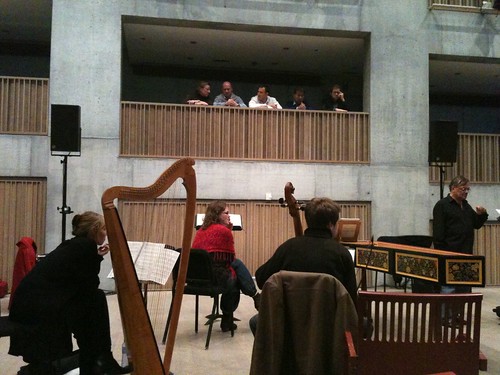Nowadays it’s popular to be against meetings, to hack meetings or simply to ignore them. If meetings would have no added value I am pretty sure we would have abandoned them long time ago. So being against them is hot but it won’t get us any further. Instead I propose to use them differently, like musicians do.
It could have been a confession on an AA meeting: “Hello, my name is Luc, I am 37 and I have an issue with meetings. The bad news is that I happen to be in profession where meetings are the most essential working instrument.” I am not following any counseling or therapy for this ‘dis-ease’, but sometimes it would be better if I did. Imagine a musician declaring that he has an issue with his instrument. He would have a hard time making a living.

Allow me to zoom in on the musician. In the course of the past year I had the chance to observe a lot of talented musicians and the way they rehearse. Rehearsals are to a musician what a meeting is to a manager: a way to prepare for excellence. Here are some things we can learn from talented musicians rehearsing for a performance:
- Preparation: This sounds too obvious to be true: musicians prepare their scores individually before coming to the rehearsal. They know that the time that they will spend together is limited, so they make sure they know their part.
- Purpose: Another thing that is worth mentioning is that rehearsals only take place once it has been decided which piece will be performed and which musicians will bring the performance. That way, a conductor never invites a musician who doesn’t have anything to do with the performance (sounds familiar?)
- Tuning of the instruments: this is how every rehearsal starts… an ugly cacophony of weird sounds. All musicians are tuning their instruments with only one purpose: to be in sync with the team.
- Taking notes: It is remarkable how literally all musicians are taking notes and making amendments to their scores. They do this continuously, even though the scores contain all the details of the music. This is like the plan of your project and it may be as detailed as the scores of these musicians. Still the success of the performance depends on the adjustments that all individuals make in order to make the plan work. This is the difference between installation (playing the scores) and realization (bringing the performance). Installation can be done without rehearsals. Realization requires tuning, synching and taking notes.
- Focus: A conductor knows like no other that time is money, so he makes sure that the time that the musicians are together is spent on aspects that require them to be together in the same room at the same time.
It turns out that attending meetings like musicians attend rehearsals would be a good therapy for my discomfort. Instead of hating meetings I would be better off using them consciously, like musicians do.

